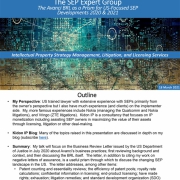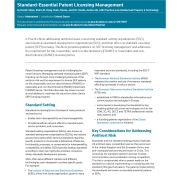A Quick Reading Comprehension Exercise
 I find it fascinating that lawyers and other lobbyists involved with SEPs get so worked up in their policy preferences that they start to have blinders that automatically insert their preferences into texts where those preferences are no where to be seen. Of course, advocates can always argue that the policy should be changed (whether it should or shouldn’t, or the change is accomplished with skullduggery is a different question – here’s looking at you IEEE). They can also argue that other factors, laws, policies, etc. require a different outcome. But to assert the wholesale insertion of a policy that isn’t there requires the faith of a “true believer.”
I find it fascinating that lawyers and other lobbyists involved with SEPs get so worked up in their policy preferences that they start to have blinders that automatically insert their preferences into texts where those preferences are no where to be seen. Of course, advocates can always argue that the policy should be changed (whether it should or shouldn’t, or the change is accomplished with skullduggery is a different question – here’s looking at you IEEE). They can also argue that other factors, laws, policies, etc. require a different outcome. But to assert the wholesale insertion of a policy that isn’t there requires the faith of a “true believer.”
Take for example the ETSI IPR policy. This poor document has been much abused by willful misreading. For now, let’s look at Section 6.1, reproduced in full below.
6 Availability of Licenses
6.1 When an ESSENTIAL IPR relating to a particular STANDARD or TECHNICAL SPECIFICATION is brought to the attention of ETSI, the Director-General of ETSI shall immediately request the owner to give within three months an irrevocable undertaking in writing that it is prepared to grant irrevocable licences on fair, reasonable and non-discriminatory (“FRAND”) terms and conditions under such IPR to at least the following extent:
-
-
- MANUFACTURE, including the right to make or have made customized components and sub-systems to the licensee’s own design for use in MANUFACTURE;
- sell, lease, or otherwise dispose of EQUIPMENT so MANUFACTURED;
- repair, use, or operate EQUIPMENT; and
- use
-
The above undertaking may be made subject to the condition that those who seek licences agree to reciprocate.
Where does this language prohibit owners of Essential IPR from choosing at what level in the supply chain to make their license offers? Contrary to some broken records on the subject IT DOESN’T! In fact, the inclusion of “have made” rights to “customized components and sub-systems” would seem to specifically allow for licensing closer to, if not at, the end-product level.
Of course, a professional SEP-licensing scare monger who thinks that 5G licensing “will be several times more expensive” that 4G licenses might be sorely tempted by their irrational fears to misread a text. Why irrational? Because all indications are that for the next few years, 5G licensing will be very similar to 4G licensing.











